- Home
- J. D. Robb
44 Delusion in Death Page 8
44 Delusion in Death Read online
Page 8
“Nor have I, before this, and it sounds like the military shut the door on it. If any of it came here, or threatened to, Homeland would’ve had a part in that,” he added. “Closing it, covering it. It’s something they’re good at.”
“We’re not dealing with them yet.” She released her weapon harness, set it aside. “If and when we do, the more we know, the better.” Sitting, she pulled off her boots. “And if and when, if we find out they knew there was a formula, and what happened today was a possibility—and they just kept the lid on? I’m going to bury them.”
“You’ll need two shovels as I’ll want one of my own.”
If it came to it, she’d make sure he had an active part in exposing who and what in the agency played a part. Odds were, she mused, she wouldn’t have to make sure of anything, and he’d see to it himself.
They’d have different reasons, and his would be payback. Then again, that was its own form of justice.
“I want a shower before I get to it.” She walked toward the bath, stopped. Gave him a look and crooked her finger.
He lifted his brows. “Oh, really?”
“Up to you, ace, but in about thirty seconds, I’m going to be hot and wet. You’re going to want to finish getting out of that suit.”
A round of water sports might be just the thing, he decided, to take both of them away from the ugliness of the day for a time.
Life needed to be lived.
As he suspected, steam billowed through the wide opening of the glass-walled shower. She had every jet pumping, and brutally hot at that. He wondered it didn’t blister her skin.
But there she stood, long and sleek and glistening in the mists and the water, her face lifted, her short cap of hair glossy as a seal’s coat.
He stepped in behind her, winced at the boiling punch of the waterfall. A small price to pay, he thought as he wrapped his arms around her, nuzzled his lips at the curve of her neck.
“Knew I could count on you.” She hooked her arm around his neck, leaned back into him. “Feels good.”
“You do.” To prove it, he slid his hands up her body, glided them over her breasts. “I won’t speak of the lobster boil of the water.”
“We’re burning out toxins.”
“Is that the way of it?”
“That’s my story.” She turned, slippery and quick, to lock herself to him, to fix her mouth to his, drowning them both in the fast-rising flood of need.
His mind emptied but for her, the hungry mouth, the urgent press of her body. Steam rose up, swirled around them as he took his hands over all those lovely, familiar places. Made her gasp and moan and reach.
He spun her around, pressed her to the wall and gave himself the pleasure of her back. The line of it, the tough cut of muscle under smooth skin.
He tapped a tile then filled his hands with fragrant soap. Slowly at first, slowly running it over her in a slick foam. Back and shoulders, hips and thighs, belly and breasts, until her breath was deep and uneven, until the scent swirled like the steam.
Hands and mouth, only hands and mouth—still slow, lulling and seducing so his cop, his warrior, his wife trembled.
As did his own heart.
His fingers found her, teased, a featherlight torture.
Lost in him. Her hands fisted against the dripping wall as her system churned, yearned. She wanted to turn to him, take him in. Take him. But he’d trapped her, and used her, undid her.
Inch by inch he took her up, and held her, somehow held her back from that last reach so she quaked and writhed, steeped in pleasure, and just short of release.
“I can’t.”
“You can.” Once again he pressed his lips to the curve of her throat.
Release crawled through the madness of sensation. She couldn’t breathe without feeling. So much, so much. It rolled through her, a wave that built and built as it rose. Pleasure and relief blurred together, dizzying, glorious.
He turned her. She saw only the wild blue of his eyes, then his mouth was on hers again, ravaging, wrecking even as he drove into her.
Now the slap of wet flesh with the pounding drum of water, and the glory of mindless mating. He took her stroke by powerful stroke, stealing every thought, filling every void.
She fisted her hands in his hair, drew him back. She wanted his face in her eyes as well as her mind.
“You. Just you.”
The words, the magic of them struck his heart. Then for the last time he pressed his lips to the curve of her neck, and breathing her, let go.
They held each other up. Eve figured she’d get her breath back in a day or two. It might take up to a week before she got any strength back in her legs.
Otherwise, all good.
She’d figured they’d have a quick, stress-reducing bang, and instead, they’d come together in a way that left her both unwound and energized. If she didn’t count her still-weak knees.
“I think we need to get out of here,” she managed.
“Not yet.”
“I’m pretty sure I can crawl.”
“We’ll do better. Decrease jet temp to eighty-six degrees.”
“Wait—” The water poured cool considering what it had been. She squealed, cursed, struggled, but he held her snug to the wall.
Laughing, he snuggled her closer. “It’ll wake you up, and it’s the same temperature as the pool. Hardly an ice bath.”
It felt like one to her. “Jets off! Off, off, fucking off!”
When they shut down, she shoved her dripping hair out of her eyes, scorched him with a look.
He only gave her the most pleasant of smiles in return.
Hadn’t she said men had juvenile senses of humor? “You think that was funny?”
“I do, yes. And refreshing. And I bet you can walk under your own power now.”
Because she certainly could—and not to prove him right—she strode straight into the drying tube, letting out a relieved breath when the warm air swirled.
Through the glass she watched him select a towel. He sent her a grin as he dried off, then slung the towel over his hips and walked back to the bedroom.
He’d pulled on jeans and a T-shirt by the time she came out, so she did the same.
She gave one brief thought to the fact most people were in bed, or at least thinking about getting there at this time of night.
Cops weren’t most people.
“I’m going to get started,” she told him.
“As am I.” He walked out with her. “I’ll give you whatever help I can once I’ve sorted some things out.”
They separated to their adjoining offices.
She set up her board first, lining up the faces of the dead, those who lived, and those who connected to them.
In her little kitchen, she programmed coffee, took it to her desk. There she sat a few minutes, feet up, eyes on the board. Let her thoughts wander.
Controlled. Callous—didn’t care who died. Even if it had been target specific on one or more vics, the collateral damage didn’t bother him, them.
Potentially that was the point. Kill as many as possible.
Political agenda unlikely. If there’d been one, credit would’ve been taken. That made it personal, but not intimate.
Not sexual. No monetary gain—none that showed, she amended.
Playing God—that’s what Mira had said, and that fit best.
She turned to the computer and began to run probabilities. She wrote a report on the interview with Carstein and Detweiler, checked her incoming, added what her teams had finished into the report.
Until she knew more about the Urban War connection, should there be one, she left it out of the reports. If the feds or Homeland came on board, they’d demand copies of all files.
When Roarke came in, she’d poured more coffee and was up, circling the board.
“What can I do?”
“The notifications are complete, in person or via ’link for those outside of New York. Interviews with next of kin give u
s a few things to check out. Bad breakups, troubled marriages or relationships, family or employment tensions. We’ve got two vics who fairly recently filed for restraining orders—both on spouses citing abuse, and in one case spousal rape.”
“You don’t think it’s anything like that. A jealous boyfriend, an abusive husband, an angry sister or daughter.”
“Probability’s low, but everyone has to be checked out. The whole thing could have been a cover for a single target.”
Who would do that? she wondered. Kill dozens for the one?
Then shaking her head, she answered her own question. “People are fucked up, Roarke. Your spouse leaves you, or has you tossed in jail for smacking her around? Go big. Take her out, and take her friends or her new lover out, too. Take a shitload of people out, and more, you’ve got a way to make them do it to themselves.”
“Striking or raping your mate doesn’t say controlled to me.”
“Sure, it can be. My father was controlled, in his way. He kept me isolated and afraid for the first eight years of my life. He did whatever he wanted to me.”
“You were a child.”
“Not the point. It’s not,” she insisted. “He controlled Stella, too, again in his way. Convincing her to get pregnant, give birth, deal with me. If Mira were to profile him, he’d fit this pretty well. Except there’s no payday here—not that I can see, and that was the driving force with him.”
“He’s on your mind,” Roarke stated. “Him, McQueen, Stella.”
“Not up front. They destroyed lives, and these are a lot of lives destroyed. So … I thought of Cassandra, too, how that group targeted New York landmarks, taking out innocent lives in the bargain. That was obsession as much as terrorism. And this doesn’t strike me the same.”
Understanding how she worked, Roarke gave her a springboard. “How is it different?”
“He wants blood, but he doesn’t want to get bloody. He wants death, but doesn’t want to kill—not directly. He doesn’t need to watch the lights go out, to smell the fear, to taste the pain. Playing God, yeah, but playing God with science.”
“The two aren’t mutually exclusive.”
“No, but some insist they are. Like God’s all, zip, pow, and creates an orangutan out of thin air.”
“I simply adore your mind.”
“Well, that’s the nutshell from one side, and the other far end’s all, no, uh-uh. No higher power out there. What happened was basically a giant fart in space, and boom.”
“Absolutely adore it,” Roarke repeated. “A space fart to orangutans?”
“Eventually. But there’s a big middle ground who mostly figure God and science can coexist just fine. Like maybe he even created it. So it’s fun to play God with science. That’s what a formula is, right? Science. That’s how they came up with stuff like LSD. Science. So …”
She did another circle around the board. “Does he have some background in science, or some connection to someone who does? And what’s the trigger? Why that place at that time? Why now? It’s a big statement. So there’s a reason he made it now, made it there.”
“If it’s connected to the Urban incidents, he may be military, or have been. Or works, has worked, for whatever agencies have the files.”
“Yeah, I’ve got that, but it doesn’t feel military. Cassandra, that felt military—or para. Big target, threats, taking credit, issuing warnings. This is personal. It’s people, not things. Not symbols. There’s something personal about this, and that’s what I have to find.”
She rocked on her heels. “One step—rule out money as motive, or don’t. We check financials, see if any of the vics had a big, fat insurance policy, or bank account. And if so, who gets it? Another kind of gain. Power or position. A lot of the vics had high-end careers, and were climbing the corporate ladder or worked for those who do and are. So who goes up a rung or two if their associate or competitor falls off the ladder?”
She turned to him. “You can start with money, power, and position since that’s your deal.”
“All right.”
“I’ll take jealousy, personal gripes, and the rest.”
“Because that’s your deal?”
She shrugged. “If you cheated on me, I wouldn’t kill a bar full of people. Just you,” she said with a big smile. “And I’d do it myself because that’s how much I care.”
“I’m touched.” He moved to her, cupped her face. “Don’t work yourself into a stupor. You have to take your own power and position at your eight o’clock briefing.”
“I’m good.”
“Stay that way.” He kissed her lightly before returning to his office.
Pumped with more coffee, she dug for spouses, cohabs, lovers—former and current. She pored over family members. She scanned for official complaints or civil suits, picked through for criminal records, cross-referenced with any education, experience or employment within the military or that had connections to drugs, labs, added in medical, practice or research.
Like slogging through knee-deep mud, she thought, aligning, realigning bytes of data.
Because she wanted the visual, she hauled in another board, filled it with her possible suspects, connected them with the specific victim or victims.
She had a contentious divorce with an equally contentious child custody battle. A former cohab charged with assault who’d done time. A vic who’d worked in corporate medicine, another whose brother was an internist, a mother who was a retired army colonel. Six civil suits filed for a variety of reasons, and a number of family members, cohabs, spouses, exes, and coworkers with criminal records.
Not as many as she’d feared, she thought, but still numerous. She sat again, put her feet up again, and studied the faces of her possibles. Lives to explore, questions to ask. Lines to tug.
Some may—should—connect to whoever Roarke found. Those she’d bounce to the head of the class. Two motives were better than one.
It would give the investigation, at least an arm of the investigation, a direction. If the direction was correct, one of those faces hid a calculating, psychotic nature.
Most people, however clever, however controlled, never hid it completely. There were chinks, clues, habits. At some point, the real person showed through the facade.
Most tended to live alone, live quietly, keep to themselves—as neighbors and coworkers routinely claimed after the killer among them was revealed.
But not this one, no, she didn’t think this one stayed huddled in his space.
He frequented or worked in that bar. He knew how to socialize, how to make himself part of the fabric. He thought far too much of himself to live the quiet, unassuming life.
That’s what her father had done, though he’d traveled from place to place, never staying too long. But he’d socialized while leaving her locked away. He’d made his deals, run his cons, played his games.
As Stella had. Morphing, absorbing herself into the role she played. But there’d been chinks, other than the ones the child had seen long before the worst of the nightmare began. Weaknesses for illegals, for sex, for money, and a pure love of destroying others on the way to the goal.
Annoyed, she pushed herself up straight. Why was she thinking about them? They had nothing to do with the case, no connection or correlation to it. Yet her thoughts kept drifting back to both of them, to Dallas, to all that pain.
Push it down, push it away, she ordered herself.
Though she understood it was likely a waste of time she ran fresh probabilities, and picked three possibles at random. She did deeper runs now, shifting through layers, looking for triggers, abnormalities, odd affiliations.
To switch her focus and keep sharp, she brought up a split screen of crime scene images and the promotion image of the bar, before it was washed in blood.
She tried to imagine the killer. Had he served drinks or ordered them? Had he walked in that day with a smile on his face, alone, in company, or to take his shift?
Sat at the bar, or worked
behind it?
Ventilation system was on, circulating the air. That’s what carried the substance throughout.
The bar, she thought again, or near it. The bar’s the hub. Not a big place, and everyone’s moving or talking—grabbing food, ordering drinks while they’re still on special.
Sit at the bar, your back’s to the room, she thought. But you could angle your stool, or use the mirror behind the bar to keep an eye on things.
She put her feet up again, thinking position. And tried to put herself inside that noise, that movement—the smells, the sounds.
As the long day took its toll, and she began to drift, she imagined too well.
Voices bounced off the walls, cutlery clattered at tables while people dug into the nachos, potato skins, rice balls, and drank away the dregs of the workday.
She recognized them—CiCi Way, and Macie Snyder, the boyfriend, the blind date laughing around the table.
Joe Cattery at the bar with Nancy Weaver, Lewis Callaway, Stevenson Vann, the accountant sitting alone with his work waiting for the latte he’d never drink.
The bartender, working the stick and arguing sports with a man he’d soon try to kill.
Joe Cattery turned to her first.
“I’ll be dead in a few minutes. Since you’re here, why don’t you stop it? I’d really like to see my wife and kids again.”
“Sorry. It’s already done. I’m just here to figure it out.”
“I just wanted a couple drinks. I wasn’t hurting anybody.”
“No, but you will.”
She watched Macie and CiCi get up, start toward the stairs leading down.
“We were going to have dinner,” Macie told Eve. “I have a good boyfriend, and an okay job. I’m happy. Still, I’m nobody. I’m just not that important, you know?”

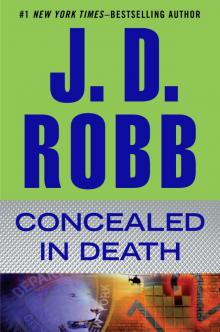 Concealed in Death
Concealed in Death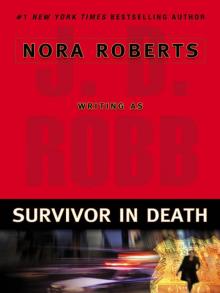 Survivor in Death
Survivor in Death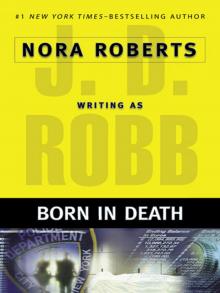 Born in Death
Born in Death Ceremony in Death
Ceremony in Death Indulgence in Death
Indulgence in Death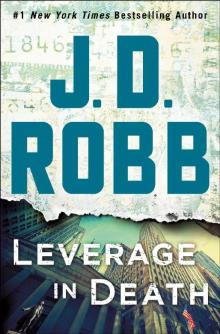 Leverage in Death
Leverage in Death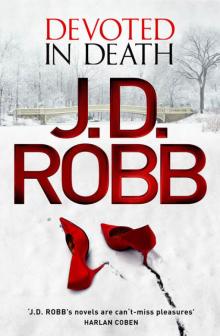 Devoted in Death
Devoted in Death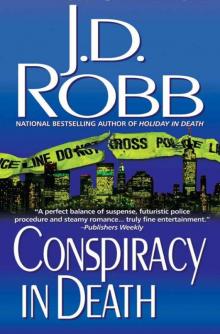 Conspiracy in Death
Conspiracy in Death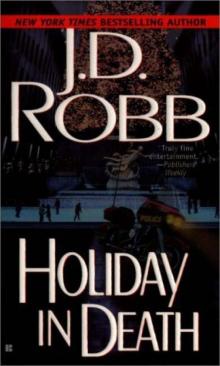 Holiday in Death
Holiday in Death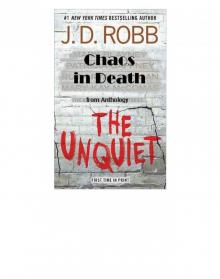 The Unquiet
The Unquiet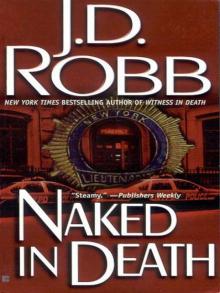 Naked in Death
Naked in Death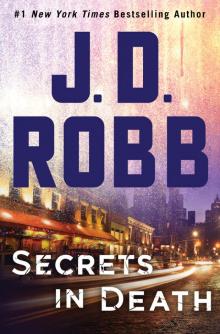 Secrets in Death
Secrets in Death Seduction in Death
Seduction in Death Strangers in Death
Strangers in Death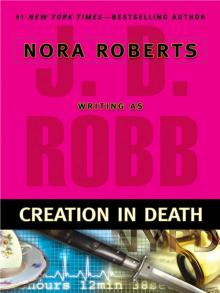 Creation in Death
Creation in Death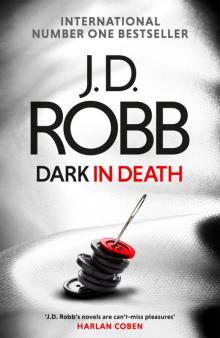 Dark in Death
Dark in Death Possession in Death
Possession in Death Visions in Death
Visions in Death Midnight in Death
Midnight in Death Innocent in Death
Innocent in Death Vengeance in Death
Vengeance in Death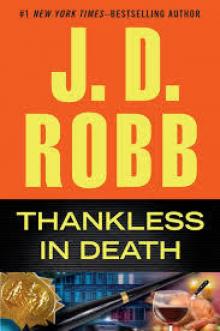 Thankless in Death
Thankless in Death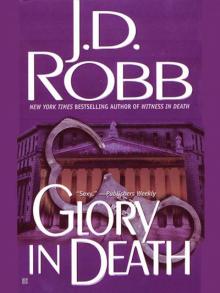 Glory in Death
Glory in Death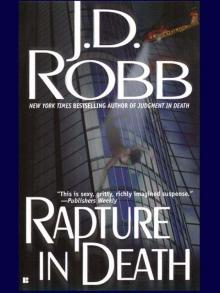 Rapture in Death
Rapture in Death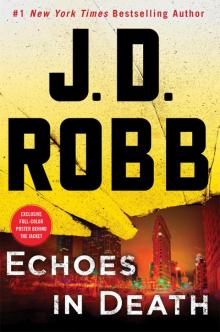 Echoes in Death
Echoes in Death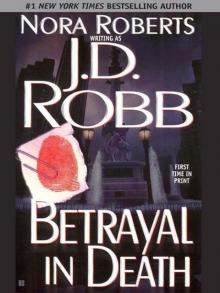 Betrayal in Death
Betrayal in Death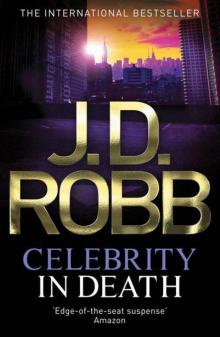 Celebrity in Death
Celebrity in Death Immortal in Death
Immortal in Death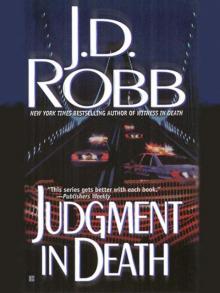 Judgment in Death
Judgment in Death Ritual in Death
Ritual in Death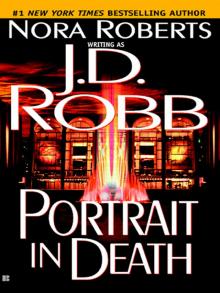 Portrait in Death
Portrait in Death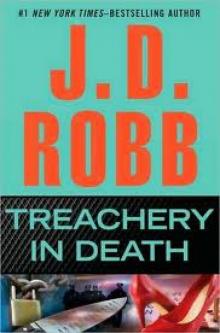 Treachery in Death
Treachery in Death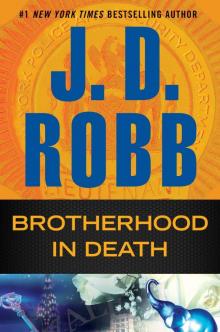 Brotherhood in Death
Brotherhood in Death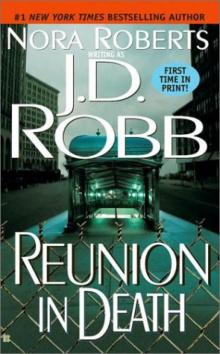 Reunion in Death
Reunion in Death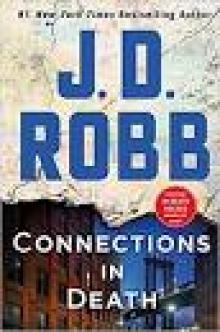 Connections in Death: An Eve Dallas Novel
Connections in Death: An Eve Dallas Novel Imitation in Death
Imitation in Death New York to Dallas
New York to Dallas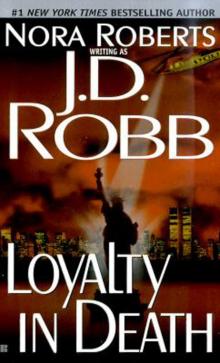 Loyalty in Death
Loyalty in Death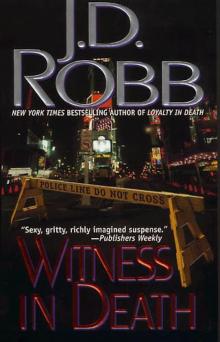 Witness in Death
Witness in Death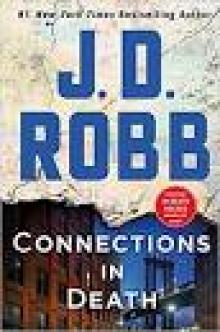 Connections in Death
Connections in Death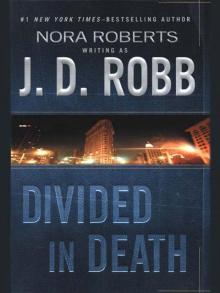 Divided in Death
Divided in Death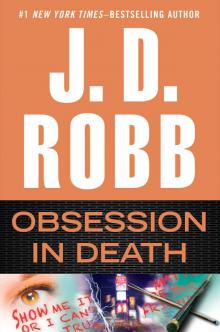 Obsession in Death
Obsession in Death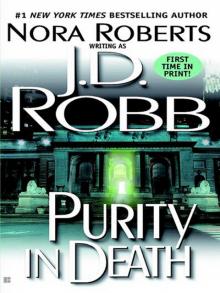 Purity in Death
Purity in Death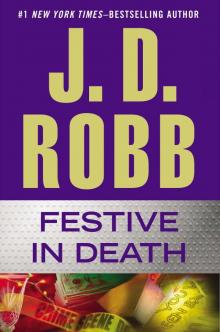 Festive in Death
Festive in Death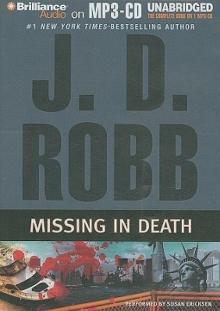 Missing in Death
Missing in Death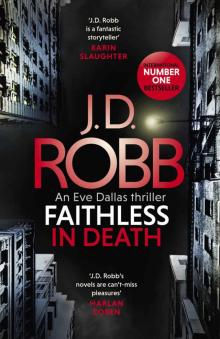 Faithless in Death: An Eve Dallas Thriller (Book 52)
Faithless in Death: An Eve Dallas Thriller (Book 52)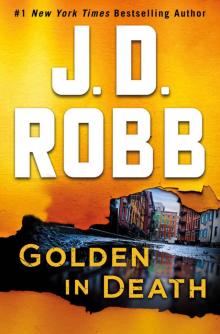 Golden in Death
Golden in Death The In Death Christmas Collection
The In Death Christmas Collection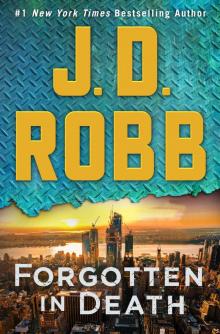 Forgotten in Death
Forgotten in Death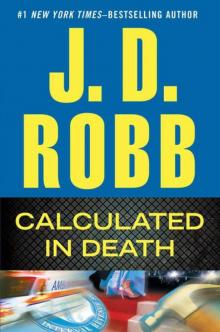 Calculated in Death
Calculated in Death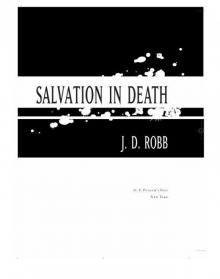 Salvation in Death
Salvation in Death Interlude in Death
Interlude in Death Haunted in Death
Haunted in Death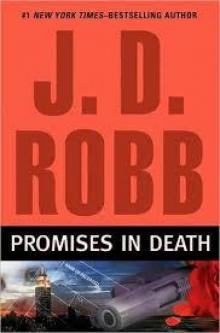 Promises in Death
Promises in Death In Death 07.5 - Midnight in Death
In Death 07.5 - Midnight in Death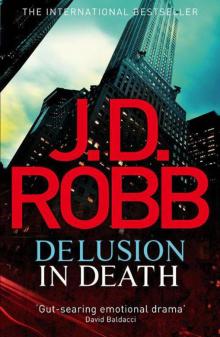 44 Delusion in Death
44 Delusion in Death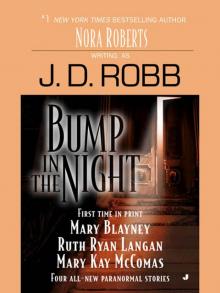 Bump in the Night
Bump in the Night The In Death Collection, Books 16-20
The In Death Collection, Books 16-20![[In Death 17] - Imitation in Death Read online](http://i1.bookreadfree.com/i/03/20/in_death_17_-_imitation_in_death_preview.jpg) [In Death 17] - Imitation in Death
[In Death 17] - Imitation in Death In Death 06 - Vengeance in Death
In Death 06 - Vengeance in Death Dead Of Night
Dead Of Night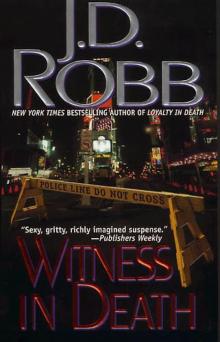 In Death 10 - Witness in Death
In Death 10 - Witness in Death![[In Death 16] - Portrait in Death Read online](http://i1.bookreadfree.com/i1/03/27/in_death_16_-_portrait_in_death_preview.jpg) [In Death 16] - Portrait in Death
[In Death 16] - Portrait in Death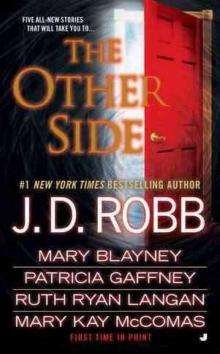 Possession in Death edahr-39
Possession in Death edahr-39 Remember When edahr-20
Remember When edahr-20 Big Jack
Big Jack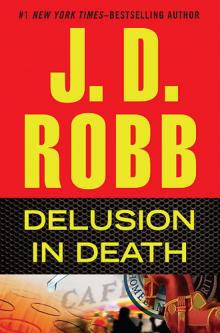 Delusion in Death edahr-44
Delusion in Death edahr-44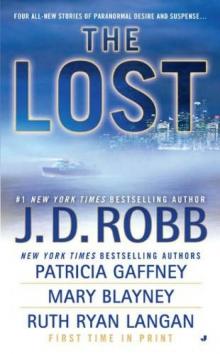 Missing in Death edahr-36
Missing in Death edahr-36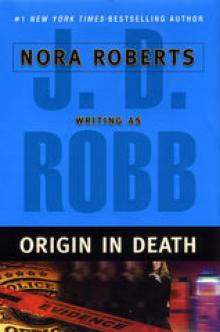 Origin in Death edahr-24
Origin in Death edahr-24![[In Death 18] - Divided in Death Read online](http://i1.bookreadfree.com/i1/04/03/in_death_18_-_divided_in_death_preview.jpg) [In Death 18] - Divided in Death
[In Death 18] - Divided in Death The Lost
The Lost![[In Death 05] - Ceremony in Death Read online](http://i1.bookreadfree.com/i1/04/01/in_death_05_-_ceremony_in_death_preview.jpg) [In Death 05] - Ceremony in Death
[In Death 05] - Ceremony in Death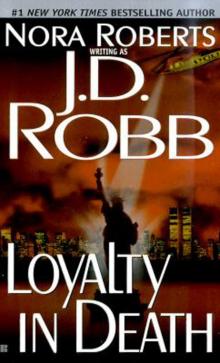 In Death 09 - Loyalty in Death
In Death 09 - Loyalty in Death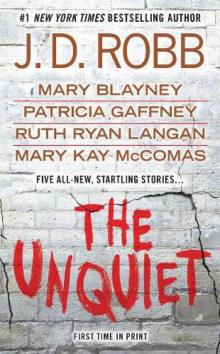 Chaos in Death edahr-42
Chaos in Death edahr-42 In Death 12.5 - Interlude in Death
In Death 12.5 - Interlude in Death![In Death [47] Leverage in Death Read online](http://i1.bookreadfree.com/i1/04/01/in_death_47_leverage_in_death_preview.jpg) In Death [47] Leverage in Death
In Death [47] Leverage in Death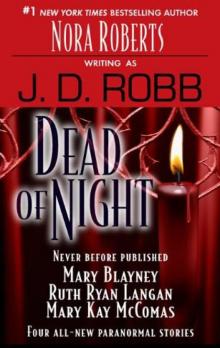 In Death - 24.50 - Dead of Night
In Death - 24.50 - Dead of Night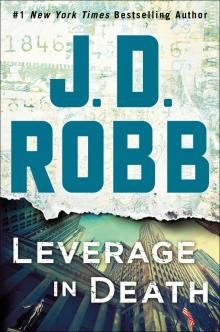 Leverage in Death--An Eve Dallas Novel
Leverage in Death--An Eve Dallas Novel![[In Death 24] - Innocent in Death Read online](http://i1.bookreadfree.com/i1/04/05/in_death_24_-_innocent_in_death_preview.jpg) [In Death 24] - Innocent in Death
[In Death 24] - Innocent in Death![[In Death 15] - Purity in Death Read online](http://i1.bookreadfree.com/i1/04/05/in_death_15_-_purity_in_death_preview.jpg) [In Death 15] - Purity in Death
[In Death 15] - Purity in Death The In Death Collection, Books 26-29
The In Death Collection, Books 26-29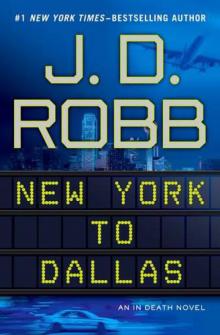 New York to Dallas edahr-41
New York to Dallas edahr-41 The Other Side
The Other Side The In Death Collection 06-10
The In Death Collection 06-10![[In Death 08] - Conspiracy in Death Read online](http://i1.bookreadfree.com/i2/04/05/in_death_08_-_conspiracy_in_death_preview.jpg) [In Death 08] - Conspiracy in Death
[In Death 08] - Conspiracy in Death The In Death Collection, Books 21-25
The In Death Collection, Books 21-25 Memory in Death edahr-25
Memory in Death edahr-25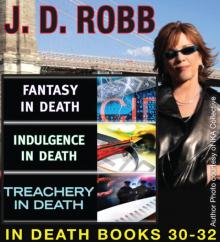 The In Death Collection, Books 30-32
The In Death Collection, Books 30-32 Down the Rabbit Hole
Down the Rabbit Hole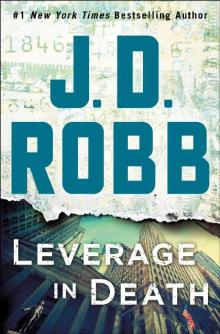 Leverage in Death: An Eve Dallas Novel (In Death, Book 47)
Leverage in Death: An Eve Dallas Novel (In Death, Book 47) The In Death Collection, Books 6-10
The In Death Collection, Books 6-10 The In Death Collection, Books 11-15
The In Death Collection, Books 11-15 Celebrity in Death edahr-43
Celebrity in Death edahr-43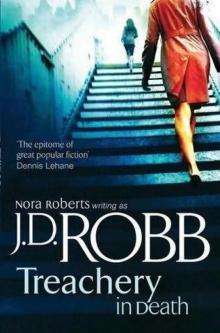 Treachery in Death edahr-40
Treachery in Death edahr-40![[In Death 12] - Betrayal in Death Read online](http://i1.bookreadfree.com/i2/04/13/in_death_12_-_betrayal_in_death_preview.jpg) [In Death 12] - Betrayal in Death
[In Death 12] - Betrayal in Death The In Death Collection, Books 1-5
The In Death Collection, Books 1-5